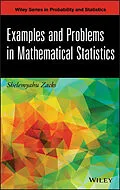Provides the necessary skills to solve problems in mathematical statistics through theory, concrete examples, and exercises
With a clear and detailed approach to the fundamentals of statistical theory, Examples and Problems in Mathematical Statistics uniquely bridges the gap between theory andapplication and presents numerous problem-solving examples that illustrate the relatednotations and proven results.
Written by an established authority in probability and mathematical statistics, each chapter begins with a theoretical presentation to introduce both the topic and the important results in an effort to aid in overall comprehension. Examples are then provided, followed by problems, and finally, solutions to some of the earlier problems. In addition, Examples and Problems in Mathematical Statistics features:
* Over 160 practical and interesting real-world examples from a variety of fields including engineering, mathematics, and statistics to help readers become proficient in theoretical problem solving
* More than 430 unique exercises with select solutions
* Key statistical inference topics, such as probability theory, statistical distributions, sufficient statistics, information in samples, testing statistical hypotheses, statistical estimation, confidence and tolerance intervals, large sample theory, and Bayesian analysis
Recommended for graduate-level courses in probability and statistical inference, Examples and Problems in Mathematical Statistics is also an ideal reference for applied statisticians and researchers.
Autorentext
SHELEMYAHU ZACKS, PHD, is Distinguished Professor in the Department of Mathematical Sciences at Binghamton University. He has published several books and more than 170 journal articles on the design and analysis of experiments, statistical control of stochastic processes, statistical decision theory, sequential analysis, reliability, statistical methods in logistics, and sampling from finite populations. A Fellow of the American Statistical Association, Institute of Mathematical Sciences, and American Association for the Advancement of Sciences, Dr. Zacks is the author of Stage-Wise Adaptive Designs, also published by Wiley.
Inhalt
Preface xv
List of Random Variables xvii
List of Abbreviations xix
1 Basic Probability Theory 1
Part I: Theory 1
1.1 Operations on Sets 1
1.2 Algebra and -Fields 2
1.3 Probability Spaces 4
1.4 Conditional Probabilities and Independence 6
1.5 Random Variables and Their Distributions 8
1.6 The Lebesgue and Stieltjes Integrals 12
1.6.1 General Definition of Expected Value: The Lebesgue Integral 12
1.6.2 The StieltjesRiemann Integral 17
1.6.3 Mixtures of Discrete and Absolutely Continuous Distributions 19
1.6.4 Quantiles of Distributions 19
1.6.5 Transformations 20
1.7 Joint Distributions Conditional Distributions and Independence 21
1.7.1 Joint Distributions 21
1.7.2 Conditional Expectations: General Definition 23
1.7.3 Independence 26
1.8 Moments and Related Functionals 26
1.9 Modes of Convergence 35
1.10 Weak Convergence 39
1.11 Laws of Large Numbers 41
1.11.1 The Weak Law of Large Numbers (WLLN) 41
1.11.2 The Strong Law of Large Numbers (SLLN) 42
1.12 Central Limit Theorem 44
1.13 Miscellaneous Results 47
1.13.1 Law of the Iterated Logarithm 48
1.13.2 Uniform Integrability 48
1.13.3 Inequalities 52
1.13.4 The Delta Method 53
1.13.5 The Symbols op and Op55
1.13.6 The Empirical Distribution and Sample Quantiles 55
Part II: Examples 56
Part III: Problems 73
Part IV: Solutions to Selected Problems 93
2 Statistical Distributions 106
Part I: Theory 106
2.1 Introductory Remarks 106
2.2 Families of Discrete Distributions 106
2.2.1 Binomial Distributions 106
2.2.2 Hypergeometric Distributions 107
2.2.3 Poisson Distributions 108
2.2.4 Geometric Pascal and Negative Binomial Distributions 108
2.3 Some Families of Continuous Distributions 109
2.3.1 Rectangular Distributions 109
2.3.2 Beta Distributions 111
2.3.3 Gamma Distributions 111
2.3.4 Weibull and Extreme Value Distributions 112
2.3.5 Normal Distributions 113
2.3.6 Normal Approximations 114
2.4 Transformations 118
2.4.1 One-to-One Transformations of Several Variables 118
2.4.2 Distribution of Sums 118
2.4.3 Distribution of Ratios 118
2.5 Variances and Covariances of Sample Moments 120
2.6 Discrete Multivariate Distributions 122
2.6.1 The Multinomial Distribution 122
2.6.2 Multivariate Negative Binomial 123
2.6.3 Multivariate Hypergeometric Distributions 124
2.7 Multinormal Distributions 125
2.7.1 Basic Theory 125
2.7.2 Distribution of Subvectors and Distributions of Linear Forms 127
2.7.3 Independence of Linear Forms 129
2.8 Distributions of Symmetric Quadratic Forms of Normal Variables 130
2.9 Independence of Linear and Quadratic Forms of Normal Variables 132
2.10 The Order Statistics 133
2.11 t-Distributions 135
2.12 F-Distributions 138
2.13 The Distribution of the Sample Correlation 142
2.14 Exponential Type Families 144
2.15 Approximating the Distribution of the Sample Mean: Edgeworth and Saddlepoint Approximations 146
2.15.1 Edgeworth Expansion 147
2.15.2 Saddlepoint Approximation 149
Part II: Examples 150
Part III: Problems 167
Part IV: Solutions to Selected Problems 181
3 Sufficient Statistics and the Information in Samples 191
Part I: Theory 191
3.1 Introduction 191
3.2 Definition and Characterization of Sufficient Statistics 192
3.2.1 Introductory Discussion 192
3.2.2 Theoretical Formulation 194
